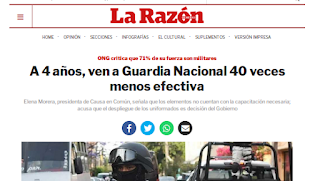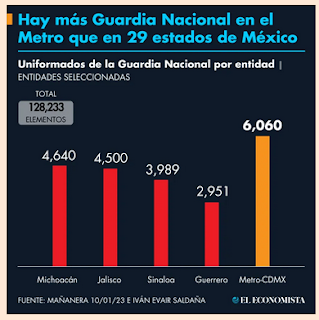AMLO's New Mexico Security Force: Useless.
Mexican NGO calls out the Guardia Nacional after four years
In 2019, Mexican president AMLO created the Guardia Nacional as a new policing force to help tackle the security problem in the Country. Unfortunately the force is little more than a unit of the military. Unconstitutional at best, it is another sign of the militarisation of Mexico that started in 1982 and continues under the present government.
Elena Morera, president of Mexican NGO Causa en Común notes the statistics that show it is more a military than police force, and not an effective one.
- 71% of personal come from the military.
- After four years they are 40 times less effective.
- 49% have not even passed their Police certification.
Image Source: https://www.razon.com.mx/mexico/4-anos-ven-gn-40-veces-efectiva-534932
Poltical goals, not security
The reason for this is that The Federal Government has deployed the Guardia Nacional for political goals rather than to stop crime, though the latter is at times part of the strategy.
Illegal migration, for example, has been an important objective of the Guardia Nacional. Its original deployment stationed the majority along migration routes in the south of Mexico. Meanwhile, in the northern states, where narco violence was higher, numbers were much lower. This year, 2023, 16,000 are assigned to the issue.
Other stats point to the forces roles as more than about security. For example 1,400 are stationed in Zacatecas where there is a lot of narco activity. Meanwhile in CDMX, where crime is relatively low, 20,000 of them are active.
Indeed, in January of this year the GN was deployed to the metro to improve security in the aftermath of a spate of irregular events. This led to more personal in the capital's metro system than in 29 other states of Mexico. Considering that the incidents are related to a lack of investment in the metro system, the security deployment looks like a psychological warfare operation.
image source: https://www.eleconomista.com.mx/politica/Hay-mas-elementos-de-la-Guardia-Nacional-en-el-Metro-de-la-CDMX-que-en-29-estados-del-pais-20230112-0105.html
NGO hypocrisy
The NGO community, who have regularly condemned the president's actions in empowering the military, also have their own agendas. Elena Morera, for example, a few weeks later called for laws to allow the military to protect the "rule of law" in the days after a narco related "terror" bombing in Jalisco.
images source: https://www.razon.com.mx/estados/suman-6-muertos-acto-terror-brutal-tlajomulco-535972
The hypocrisy of the elite classes
Morera's words are critical here because they give us an insight behind the current elite opposition to Mexico's militarisation. Her use of the term rule of law can be interpreted as "capitalism". While the narrative of narco-terrorism and failed states was one used by US government to justify the exporting of a security strategy favourable to capitalism.
In Mexico during the 2000s this facilitated two things. First, the militarisation of the border with Mexico to the US domestic audience. And, second, it permitted the integration of the Mexican military and security system into the US regional nodes without an outcry from the Mexican public.
But with AMLO, the process has gone too far. For most of the the 20th century the military was underfunded. A trend that was reversed starting in 1982. Nevertheless, under this period of (neo)liberal governments, 1982-2018, the military was limited to security. This was driven by the view that an expanded military could impeded the "free" functioning of the market. In today's new global political environment the US has taken a more relaxed view, happy that AMLO continues to support their security goals in the region. But the (neo)liberal elites of Mexico are not so happy, fearful that the political power and wealth they accrued in that period is at risk.
Of course, we should continue to resist the continued militarisation of public security in Mexico. Namely, because it is a policy that seeks to embed a disastrous form of capitalism on the nation. But we should remain mindful of the fact that (neo)liberal Mexican elites' have supported militarisation since 1982. And that their current criticism is designed to sustain their power, rather than concern for public safety.





Comments
Post a Comment